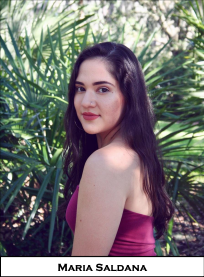 Maria Saldana graduated with the BA in Women’s Studies and a BS in Psychology in 2020. She has since started the Women’s Studies MA program at the University of Florida.
Maria Saldana graduated with the BA in Women’s Studies and a BS in Psychology in 2020. She has since started the Women’s Studies MA program at the University of Florida.
For many undergraduate students at the University of Florida, the Center for Gender, Sexualities, and Women’s Studies Research (CGSWSR), or as it is informally known as “The Center,” is unknown territory. However, students are often excited to learn that The Center offers a major and a minor in Women’s Studies, minors in Health Disparities in Society and in Theories and Politics of Sexuality, and a Master’s degree in Women’s Studies. Although The Center’s M.A. students come from all over the U.S. and abroad, they are sometimes undergraduate students from right here at UF.
One of those students is Maria Saldana (pronouns she, her, ella). Saldana recently completed her first year in the Women’s Studies MA program. Like many of our undergraduate majors, Saldana was a dual degree student. She earned a BA in Women’s Studies and a BS in Psychology, graduating cum laude in 2020. Saldana stated that her undergraduate Women’s Studies education was particularly useful because of its theoretical focus, including courses on queer Latin America and Black feminist and womanist theory. “I was intentional in choosing courses that centered Black Feminist Theory/Women of Color theory and Queer theory in Latin America as they shaped my community work and own research.” Saldana connected learning from her women’s studies course with her community work. “I’ve been involved in social justice work with my community and different collectives for a few years now. The more I dove into Women’s Studies, I saw how the work I was doing in my community was related to what I was learning in class.” Due to the smaller class sizes relative to courses in other majors, Saldana was able to receive essential feedback from her professors, which helped her to prepare for graduate studies.
I asked Saldana to reflect on any differences between being an undergraduate student and being a graduate student and if there were any surprises. Saldana said that she did not expect to start graduate school in a pandemic, and I think all UF students can agree that we did not wish to attend school while we are in a global crisis. Saldana also described unique aspects of graduate classes. For example, she said that graduate classes can be truly intimate, with class sizes ranging from six to twenty students. Saldana said that while graduate students take fewer classes than undergraduates, they must be prepared to do a lot more readings for each course than they did in undergraduate classes. However, the relationship and bond that one creates with their advisor or chair are more profound and significant. “I have loved being able to dreambuild my own work, as it feels deeply personal and also much more than that. Being able to nurture my relationship with my brilliant mentors, Dr. Hernandez and Dr. Mosley, who continue to support not just my work, but my whole self. Growing closer and learning from the talented professors in the Center, and of course, bonding with my cohort!” For her M.A. thesis, Saldana is focusing on stories from the queer Peruvian diaspora. She is working with the direction and mentoring of Dr. Jillian Hernandez (committee chair) and Dr. Della Mosley.
It was a pleasure to do this feature on Maria Saldana. During our talk, she opened my eyes to the differences between undergraduate and graduate school and life. She has persuaded me to think about getting a master’s degree in women’s studies at the Center.